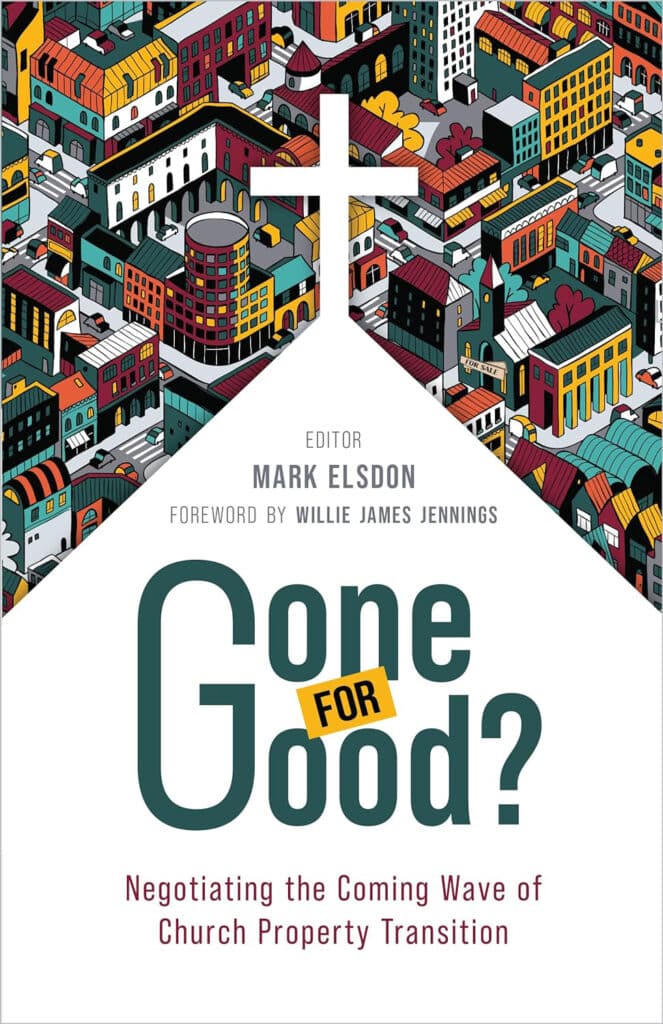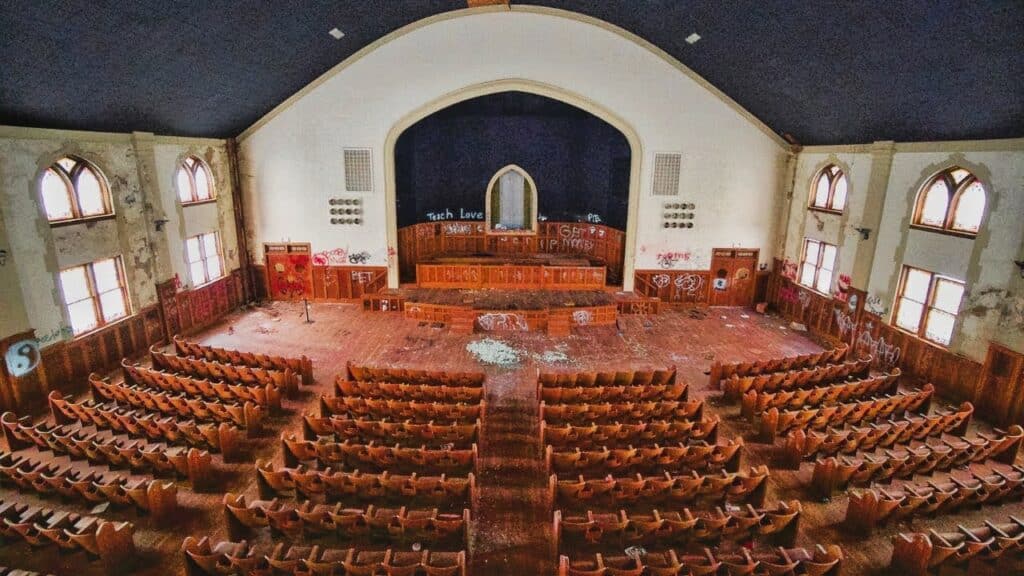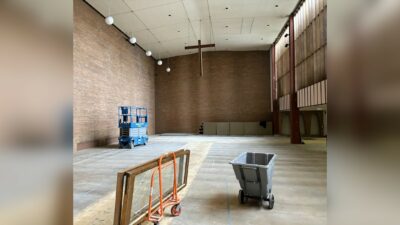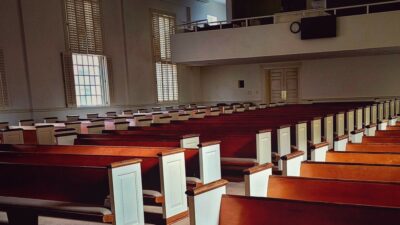If experts were predicting that 100,000 libraries across the United States were likely to close in the next few decades, people would probably sit up and take notice. Certainly, if 100,000 school buildings were going to be empty in small and large communities, someone would be talking about it.
But the possible demise of thousands of churches? Crickets, said the Rev. Mark Elsdon, a Presbyterian minister, author and social entrepreneur who co-founded RootedGood, a nonprofit that works with churches on how to use their space.
“We are not getting the same response when we say that 100,000 churches are going to close,” said Elsdon, who edited “Gone for Good?: Negotiating the Coming Wave of Church Property Transition,” a new book of essays about the future of houses of worship.
That prediction of church closings is based on the unrelenting math of religion in America — there are ever more church pews with not enough people to fill them. Those who go to church prefer to be part of large congregations, flocking to packed-out megachurches while driving by a host of struggling congregations with 60 people or fewer.
Elsdon, who is executive director of Pres House, a campus ministry in Madison, Wisconsin, said the 100,000 figure is an estimate based on trends in worship attendance. There is little data about how many churches close or what happens to houses of worship when they are no longer needed by a congregation.
Your tax-deductible gift helps our journalists report the truth and hold Christian leaders and organizations accountable. Give a gift of $30 or more to The Roys Report this month, and you will receive a copy of “Hurt and Healed by the Church” by Ryan George. To donate, haga clic aquí.

But even a half or a quarter of that number, Elsdon said, would be significant. “The bottom line is that there are fewer and fewer people identifying as Christians and attending traditional church activities in church buildings,” Elsdon said earlier this year at an event introducing his book. “Therefore, there are far more church buildings today than will be viable or needed in the future. That’s just the way it is.”
The book’s chapters, each by a different expert, outline some of the changes facing churches and some of the possible outcomes for former church buildings, from affordable housing to hubs for social entrepreneurship.
The new book’s title is a play on words. Many church buildings could be gone for good — sold off to become apartments, breweries, wedding venues or other secular uses. Or they could be gone but still used for good causes, depending on what the congregations who used to own them decide to do.
Elsdon, who helped revitalize Pres House, a century-old campus ministry that was on the verge of closing when he and his wife were hired as leaders in 2004, spoke to Religion News Service recently about the book and why the future of church property deserves more attention. This conversation has been edited for length and clarity.
Why does it matter if churches close down?
Good question. Church buildings play a central role in the social fabric and social infrastructure of communities in ways we don’t even necessarily think about until they’re not there. Churches host AA meetings, Girl Scout troop meetings and neighborhood association meetings — my neighborhood association just met in the church last night. We vote in churches. There are food pantries that many churches run. Besides the spiritual activities, the social activities that happen in church buildings are vital to the functioning of most communities. Even when churches are all but dead, their buildings are still often doing a ton of work.
One of the book’s chapters, by researcher Eileen Linder, estimates that as many as 100,000 churches may close in the next few decades. How do you talk about change on that scale?
I’ve been speaking about it recently in terms of the Blockbuster Video moment in the early 2000s, where there was such a radical shift in the way people watched movies. In that case, brick-and-mortar video rental stores disappeared very, very quickly. That was more extreme than this. But it’s similar.

People are still interested in spiritual life. They’re still interested in the divine and community — things that matter and have a purpose. But the way they go about that is not on Sunday morning in a worship service or Sunday school classes. And just like Blockbuster stores, all the space that was built for those activities is now no longer useful.
I use that Blockbuster analogy with church people because they beat themselves up about their church’s struggles. They blame themselves, or they want to blame somebody else — like the last pastor. It’s not fruitful to kind of get in that kind of blame or self-pity mode. We are experiencing a radical shift in the way hundreds of millions of people are engaged in their spiritual lives. And this is far beyond our ability in any one particular church setting or denomination to stem or change.
What keeps churches from talking about what to do with their buildings?
I think we put off things we don’t want to think about. There’s also an element of grief, which makes it hard to face. There’s a lack of hope. A lot of times there’s a lack of imagination. We get stuck in this idea that the way you get your movie is you go to Blockbuster on Friday night and the way you get your church is you go on Sunday morning. That doesn’t have to be the case.
The idea that a church is no longer ours anymore is a big part of the issue. But again — it isn’t going to be yours anyway. We’re not going to be here forever, and neither are institutions, and neither are church buildings. Let’s think about what we could leave behind.
There’s a lot of conversation about churches being transformed into affordable housing, which the book discusses. But you’ve said that they can also be turned into other kinds of public spaces.
I’ve started to see more congregations that transform their church into a community center where they are the anchor tenant. The church becomes one element of the building. Then the church can still be a vibrant little group of folks meeting together — and there are all sorts of other things happening in that space as well.
We are seeing quite a bit around entrepreneurship — small entrepreneurs, new business incubators and co-working spaces — kind of related to that. There are also kitchen programs where you take a church’s commercial kitchen and use it as an incubator for food entrepreneurs.

In the book, there’s a chapter about rural churches partnering with health care centers. I love this idea. Health care centers in rural communities don’t want to build a standalone clinic, but they do want to come two or three days a week. They can take over a chunk of a church building that’s underused, and that building is now a part-time health clinic in a rural community.
How do people get started on these kinds of ideas?
People in church will often ask this question. The church feels exhausted, there are not many people left, and they feel they are being asked to reinvent their entire selves.
I often encourage people to think about starting with just something small. Maybe start with just inviting a food truck to show up Friday night in the summer in your parking lot. Then see what happens. Just start somewhere with a bite-sized project. And if it does work, then you get all excited about it. And then you go from there.
Are enough people thinking about this issue?
From my view, no. This is one of the biggest issues facing American Christianity in the next 20 years. And it isn’t just American Christianity. This is an issue facing, you know, our communities in general. Church closures are happening in every single corner of the country. North, south, east, west, rural, urban, doesn’t matter.
I don’t think we’re thinking about it enough. But there’s much more talk of it even in the last couple of years than I’ve ever heard before.
 Bob Smietana es reportero nacional de Religion News Service.
Bob Smietana es reportero nacional de Religion News Service.




















7 Respuestas
I’ve been concerned about this for a while, as you can go around most any area and see a lot of buildings that are obviously former churches being used as art studios, beauty salons, bars, and more. My take is that at one very obvious level, our church leaderships do a much better job building buildings than we do building church members.
Regarding large churches, my key concern is that the pastor of over 1000 members does not pastor his flock in any meaningful way. So church leaders and members alike need to know each other, to pastor and be pastored by each other.
You will always have some empty buildings–churches closing in declining rural areas, churches that close because of sinful disasters in leadership, and the like–but there is a very real repentance that needs to happen from certain patterns in church leadership and membership.
And they need to remember that “Field of Dreams” was just a movie. “If you build it, he will come,” is a nice catchy line from a pretty good movie. Not so much in real life.
This is a complicated and complex issue. In Saskatchewan in the 1990’s towns were dying. The need was for pastors called to pastor the church and see the last congregants into nursing homes. There was no one to buy a building in a town with empty and collapsing buildings. In other places there are different issues I have seen. Too complex to generalize
My former church has maybe 25-30 on Sunday, most over 75, they have been offered the opportunity to merge with other churches and they refused. The pre-school is closing after this semester due to declining enrollment and no one asked for details, just voted to close it. Lovely building addition in 2016, beautiful for ministry. Observing how people interact on Sunday, this is a social club with no future. There is no spiritual strength here, thus it is my former church.
Yay…let them close. And turn the buildings into housing for the homeless and of that sort. What you do to the least of these, you also do unto me. Pure and undefiled religion to YHVH is to “care for the least of these, and keep yourself undefiled from the world” ( James 1:27)
Listen to Amos 5: “seek me and live; lest I break out like fire and devour Beth-EL and there be none to quench. Do not seek Beth-EL, nor enter Gilgal, nor pass by Beersheba. For Gilgal shall go into captivity, and Beth-El shall come to nought.
Most of these church buildings have turned from Beth-EL to Beth-Aven (house of wickedness, den of iniquities); Gilgal to Gillul (dung of idols); Beer-sheba to Beer-sheker (well of lies/falsehoods).
The time is NOW, when those who worship YHVH shall worship in spirit and in truth. The kingdom of El lies within. YOU are the holy temple, the living sacrifice, the priest. And where 2 or 3 are gathered, I AM there says the LORD.
Algunos pensamientos aquí:
1) The mainlines are continuing to decline in numbers and that will only accelerate as the their increasingly aged members die and nobody replaces them.
2) The Evangelical churches are not that far behind, as more and more people become NONES and DONES. Even more so since Evangelical Churches have for the most part become Bund meeting halls for Evangelicals’ real Lord and Savior, Donald Trump. Churches have become nothing more than political meeting houses.
3) More people are not buying what the churches are selling, especially when people see church leaders and pastors as nothing more than hucksters, frauds, and narcissistic abusers and enablers of same. Same thing for denominations. They are increasingly looked as criminal rackets whose job is to protect the brand, silence whistleblowers, and coverup abuses and crimes of leadership.
4) People realize that one has a better chance of finding the Biblical Jesus OUTSIDE of the church and away from most “Christians”.
In long run, this is a good thing as American “Christianity” ends up on the ash heap of history. Churches have become the real white-washed tombs, relics of a spirituality as obsolete as Fotomats, Blockbuster Video stores, and buggy whip stores.
Replying to Charles,
I do see the points you made, and generally agree with them, although they do not pertain to every single church, yet many.
I myself, having attended churches for about fifty years, have just in the last few, joined into a home fellowship. These are by no means perfect or a miracle cure to Americas problem, yet I find this experience to be more authentic than a traditional church. Home fellowship gatherings are custom – perhaps no two are alike, so you may find a good one, and a poor one, and a mediocre one. there is no conformity amongst them. I do prefer it – in that all members come together to both receive, and give to one another, sharing ‘equally’, instead of the format of the leaders and talent (of a traditional church) ‘give’ out to us, and we the congregants just listen and receive.
Do not think I am telling others (here in this blog) that they must like, or consider home fellowships. I am only sharing my perspective, as a former church attender, who is no longer on the church ‘rolls’, yet am still active in the universal body of Christ, in a different group.